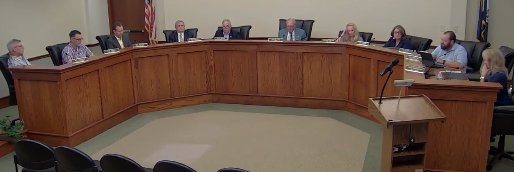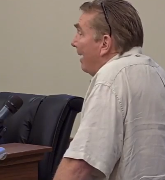By Patricia A. Scheyer
NKyTribune reporter
Two Edgewood residents attended the regular city Council meeting this week to protest the repeal of the budget process that has been in effect in the city since 1980.
Kurt Hanscom told council he asked for a copy of the budget and was denied by the city clerk, so he filed an appeal with the Attorney General.
“The Attorney General said you have to do it and I do have the budget now,” he stated. “You say on the website that you are financially transparent, and I think you need to take that down because you aren’t.”
Andria Humpert also challenged council.
“I want to hear from the council members and the mayor why would you guys would want to repeal an ordinance that talks about the budget as a public record?” she asked.
Edgewood Mayor John Link asked them both to wait until the item on the agenda came up when council would have a discussion. They both sat down.

Edgewood council (Photos by Patricia Scheyer/NKyTribune)
City Attorney Frank Wichmann led the discussion when the ordinance had its turn.
“The item came up because of the identification of sections of our code that required a public hearing in regard to the budget, and the complaint that we weren’t following those provisions,” said Wichmann. “I was asked to review that and I did. The review started with the ordinance. To my dismay, I determined that many provisions of the original ordinance were completely in conflict with the state statute in regards to the adoption of the budget. Really surprised me.”
He said because there were so many parts of the ordinance that were in conflict with the statute, he realized that they had to do something. The remedy would be to completely get rid of the current ordinance and start over, or they could just do nothing, and the state law would supercede what the city has.
“The state statute is comprehensive and it outlines the procedure for adopting a budget; you don’t need to adopt anything else – its all there,” he said. “If you want to add to it you can do that but you cannot add provisions that conflict with the statute of the constitution.”
Councilmember Darla Kettenacker questioned Wichmann on where the conflicts were which occurred within the statute, and subsequently there was some confusion as to which portions of the 20 section ordinance each person was referring to.
Into the confusion Andria Humpert spoke up from the audience and told council that they knew why people were there at the meeting, it was because of section 32.16, proposed budget and public record.
City Administrator Brian Dehner explained that they were trying to get on the same page of the same document. The confusion stemmed from the fact that there were two documents, a codification and an ordinance, and the numbers were not the same so the reference numbers were not the same, causing a confusing dialogue.

Kurt Hanscom
“Do you all have any idea of what we are talking about and why we are here?” Humpert interrupted the meeting. “Don’t insult our presence and out intelligence, you know why we’re here, just be respectful. We are trying to ask questions because we are taxpayers, and we want to know what is going on. Why on earth would you try to repeal an ordinance about transparency of the budget to citizens? Instead of repealing the ordinance you guys should be following the ordinance.”
Dehner continued with the meeting, ignoring Humpert’s outburst. and pointed out some of the inconsistencies. He said one part the ordinance states that January first is the first day of the fiscal year, and by state law, the fiscal year has to be July 1 through June 30.
“The ordinance is riddled with a bunch of those mistakes,” he said. “Back in 1980 that was the fiscal year. All of that has changed since then. It also says the budget officer shall submit the budget. By executive authority the mayor does that, and we don’t even have a budget officer. I think Frank went through a lot of those different sections and pointed out where they are in conflict with the constitution and state law. So by upholding that ordinance, you would be in conflict with the constitution and state law. And the ordinance is null and void because of that, and what Mr Wichmann is suggesting is that you clear that off the books because we have always followed the state law. He is saying If you would like to adopt a new ordinance to include certain things in it, you can do that.”
Kettenacker thought that repealing the ordinance in its entirety was excessive and that the mistakes should be corrected.
Wichmann acknowledged her point, but said as a principle of judiciary review of ordinances, if one part can be taken out and corrected that is one thing, but when there are so many provisions that are invalid in the ordinance, the review would determine that ordinance would be deemed null and void.
“Those four sections that you identified are not in conflict with any provision, but they are involved in an ordinance that is so bad it’s going to be determined to be invalid,” said Wichmann.
It was decided that the first step was to get rid of the ordinance that was null and void, and then, if council so wished, they can craft another ordinance that is constitutional and has the parts of the old ordinance in it, so they can keep the transparency going.
Mayor John Link added that when he does his state of the city report, they can just put the budget up on the website so that everyone in the city has access to it. Councilman Jeff Schreiver referred to that statement, saying that going forward anyone who wanted a copy of the budget could have it.
Attorney Wichmann explained how Hanscom was denied the budget in the first place. Years ago, he said, there was an opinion by an Attorney General that the budget was not an open record and could not be public until it was a final document passed by council, and until that time, the budget was a draft and subject to change.

Andria Humpert
He said a later opinion, from another Attorney General, which superceded the first opinion, said that as soon as the mayor makes a decision on the budget it becomes an open record and it can be made public, and many cities were not aware of that second opinion.
Discussion was held as to whether to use the word ‘draft’ for the budget that is not final, or have the word ‘proposed’ on the budget. Wichmann said it probably did not matter, as Mayor Link had said he was going to publish the budget right away.
As the council members felt they had reached agreement on the decision, Andria Humpert was permitted to speak, and she gave them her opinion.
“I’m not the enemy, I appreciate you guys’ service,” she said after acknowledging that they seem to have agreed on a solution to operate better in the future. “The last time I was here you got very defensive, and I thought I was being very respectful and nice and just asking questions. And if I could just give you my observation on the meetings I have attended in the past couple years, you guys have been wildly successful in making people feel unwelcome, and I am a taxpayer and I just want to know that the people representing me are doing the right thing. I don’t think that’s too much to ask. I actually don’t trust the process because it feels like you guys are trying to hide something. Don’t lose your way.”
















